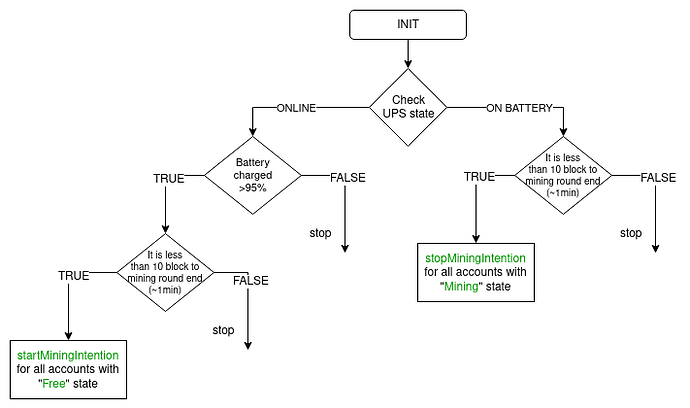l00k
May 6, 2021, 5:19am
1
Check: https://github.com/l00k/phala-ups-guard
This tools monitors UPS state.
NOTE:
I don’t want to admit but actually we would add the support of this if we have solved a problem. The state “MiningStopping” doesn’t contain the starting height. So whenever we switch to the stopping state, the starting height is dropped in the blockchain state. We cannot recover to “Mining(startHeight)” later.
This is not so hard to fix, but we see some very basic problems in the overall round design. And it turned out it’s very likely that we may abandone the round design completely. In other …
HID compatible UPS
apcupsd packagenode.js v12+
Additional for remote deployment
There are 2 ways of using this tool
You can copy few files and manually configure everything
or you can use deployer to configure everything
Copy file dist/main.js to <dest>/main.js
Configure nodes and accounts in <dest>/config.json (check configuration section)
Run with node ./main.js
Install dependencies
git clone https://github.com/l00k/phala-ups-guard.git
cd phala-ups-guard
composer install
npm ci
Configure nodes and accounts in (...)/phala-ups-guard/config.json
Configure host in (...)/phala-ups-guard/hosts.yaml
Deploy - my-ups-guard is hostname from hosts.yamlphp ./vendor/bin/dep guard:deploy my-ups-guard
You can use config.dist.json as a template.
{
"nodes": [
{ "url": "wss://poc4.phala.network/ws" },
{ "url": "http://127.0.0.1:9933" }
],
"accounts": [
{
"name": "Miner 01",
"privateKey": "abc def ghi abc def ghi abc def ghi abc def ghi"
},
{
"name": "Miner 02",
"privateKey": "abc def ghi abc def ghi abc def ghi abc def ghi"
}
]
}
nodes - list of Phala nodesnodes[idx].url - node URL - it can WebSocket or RPC HTTP serveraccounts - list of managed accountsaccounts[idx].name - account name for logging purposeaccounts[idx].privateKey - mnemonic / private key of account
You can use hosts.dist.yaml as a template.
my-ups-guard:
hostname: 123.45.67.89
port: 22
user: root
deploy_path: '/srv/guard'
my-ups-guard - deployer host identifier<host>.hostname - IP address of your node<host>.port - self explanatory<host>.user - root or other user which has access to sudo command (without password - google “visudo nopasswd”)<host>.deploy_path - directory where all scripts will be placed
zzz
August 11, 2021, 12:52pm
2
这个是什么问题
phala@phala-NUC10i3FNH:~/phala-ups-guard-master$ sudo php ./vendor/bin/dep guard:deploy[email protected] [email protected]
In Process.php line 257:
The command “rsync -azP -e ‘ssh -A’ ‘/home/phala/phala-ups-guard-master/build/main/templates/rc-script.sh’ ‘[email protected] :/srv/guard/rc-script.sh’”
Exit Code: 23(Unknown error)
Working directory: /home/phala/phala-ups-guard-master
sending incremental file list
rsync: mkstemp “/srv/guard/.rc-script.sh.EyvyTQ” failed: Permission denied (13)
guard:deploy [-p|–parallel] [-l|–limit LIMIT] [–no-hooks] [–log LOG] [–roles ROLES] [–hosts HOSTS] [-o|–option OPTION] [–] []
l00k
August 11, 2021, 1:18pm
4
you probably don’t have ssh server on localhost (which is normal).
You can also build with npm run build and copy dist/main.js to some place and configure it to run by CRON.
zzz
August 11, 2021, 2:26pm
7
我怎么检查我的ups已经正确的驱动了?
8月 11 20:06:26 phala-NUC10i3FNH systemd[1]: Starting apcupsd.service…
zzz
August 11, 2021, 2:48pm
9
phala@phala-NUC10i3FNH:~/phala-ups-guard-master$ apcaccess
is ok?
zzz
August 11, 2021, 2:51pm
10
{http://127.0.0.1:9933 ” }
在config文件中, { “url”: “wss://poc4.phala.network/ws” }, 这个是必须的吗,还是只保留 { “url”: “http://127.0.0.1:9933 ” } 这个就可以了。
zzz
August 11, 2021, 2:53pm
11
phala@phala-NUC10i3FNH:~/phala-ups-guard-master$ sudo node dist/main.js
l00k
August 11, 2021, 2:55pm
12
Try to run local node ;) and remove first entry
zzz
August 11, 2021, 11:28pm
13
phala@phala-NUC10i3FNH:~/phala-ups-guard-master$ sudo node dist/main.js
zzz
August 12, 2021, 1:04am
14
DO you have wechat or qq ?
